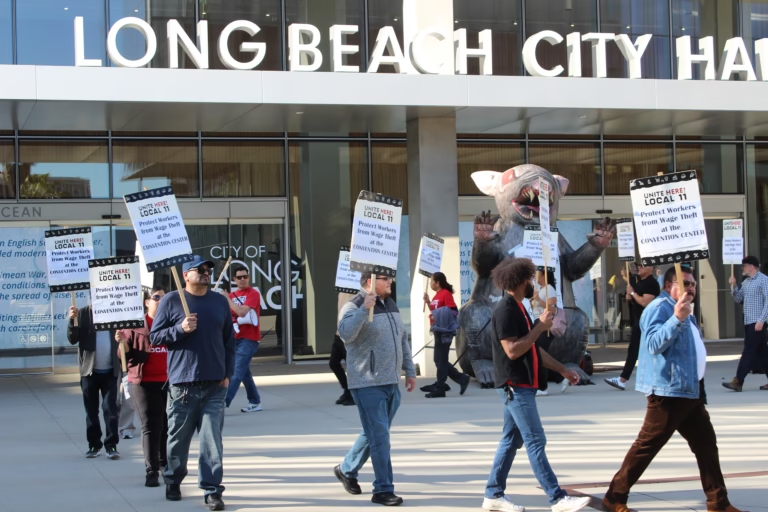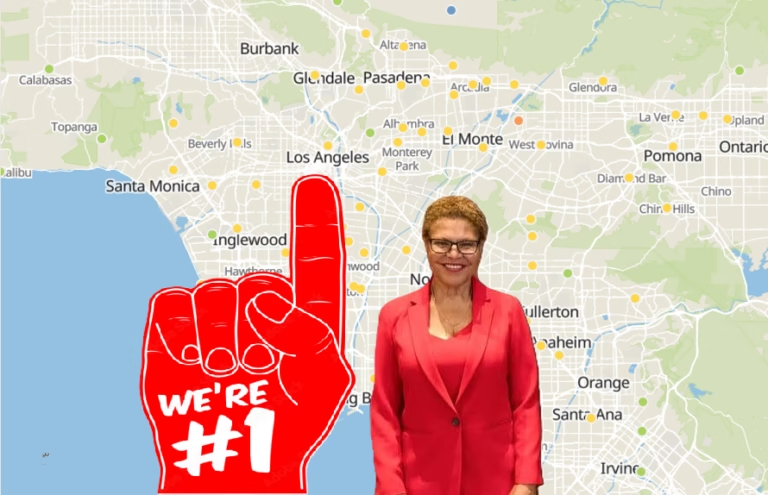“To announce that there must be no criticism of the president, or that we are to stand by the president, right or wrong, is not only unpatriotic and servile but is morally treasonable to the American public.” — President Theodore Roosevelt
The Journalist-Activist Who Helped Save Terminal Island’s History
I don’t know what comes first, activist/journalist or journalist /activist, but in either case, RLn community news reporter, Emma Rault, is both. I want to credit and thank her for her role in getting the buildings on Terminal Island designated as historical landmarks for the City of Los Angeles.
She sounded the alarm of the possible razing of those historic buildings that were the last remaining remnants of the once-thriving Japanese-American community on the Island (everyone should know that the Japanese community, mostly American citizens were forced off the Island immediately after Japan bombed Perl Harbor in Hawaii).
With the leadership of Terry Hara, Terminal Islanders Association President, project leader Paul Boyea, and VP Donna Contrell, they were able to team up with Los Angeles City Councilman Tim McOsker and get this important designation. It should be also noted that the LAPort leadership has been open and supportive of this effort of historical preservation and will be a valued critical partner in the steps forward.
I can testify to all of this because I was engaged as an advisor to this effort because of being a descendant of Terminal Islanders, my grandmother was a Japanese language school teacher, my grandfather owned and ran the only gas station in “Fish Harbor” ( what the Japanese community was called in East San Pedro) and my father, born in San Pedro Hospital, grew up there. By the way, both my older brother and I were born in that hospital.
As stated in Emma’s March Rln article, titled, “From Tuna Street to Walker’s Cafe,” we cannot let “Demolition by neglect be an existential threat to our legacy and our histories. Once again, thank you, Emma.
Last note, I don’t know what comes first… Random Lengths News is a newspaper/activist or activist/newspaper… conclusion; BOTH!
Warren Furutani
Gardena
Financial Slaves
It’s truly sad and ironic. Just about two months ago America was recognized as an “Economy” that was the “envy” of the world.” Now, our convicted criminal and traitor to our allies of a president, supported by a devious, disloyal billionaire co-president, Elon Musk, and a coterie of trifling Republicans have placed our country (America) and its citizens on track for a financial disaster, based on these facts below:
- 1. Illegally and unlawfully cut thousands of government employees’ jobs. Under Article 1 Section 8, Clause 18 (only Congress can have the power to create and remove federal agencies). Yet, these cuts and other unlawful actions are DESIGNED to devastate our economy.
- 2. Dangerous Tariffs, cutting vital benefit programs such as Social Security and Health Care. This further pushes us into a recessionary situation.
- And 3. A so-called crypto reserve is a speculation currency without a collateral value. This “Inflationary Scheme” will lead to finally add the financial collapse of our country.
To prevent us from becoming Financial Slaves, “Our Voices and the Courts’ Rules of Law” is our last resort for American Democracy!
Robert Lesley
Carson
Who Actually Pays for Tariffs?
There seem to be two belief systems on who pays tariffs. One is accurate and one is inaccurate. Under both belief systems, Americans pay the increased tariffs.
Reality:
Tariffs on goods imported from other countries into the U.S. are taxes paid by the U.S.-based importer directly to the U.S. Treasury. Such taxes are usually passed on to U.S. consumers by increased prices. They are not paid by the exporter country.
There is a paper trail of documents and wire transfers showing that the U.S. importer makes the tariff payments to the U.S. Treasury.
If the exporting country paid our tariffs, there would be documents showing payments from other countries directly to the U.S. Treasury. Those types of documents have never been produced to the public because they don’t exist.
Alternate Reality:
Tariffs on goods imported into the U.S. are paid by the exporting country. If that is true, it follows that the opposite is true too. That means that when the U.S. exports its goods to other countries, the U.S. Treasury pays the tariffs that the exporter country levies on our goods. So, either way you believe, the bottom line is Americans pay increased taxes because of increased tariffs.
John Henrichs
San Pedro, CA
Dismissal from Dodson Gifted Magnet
I am Raymond Moser and have been teaching history at Dodson Gifted/High Achieving Magnet for a quarter century. My class has always been a rite of passage for students at Dodson Magnet that prepared them for their future education, not high school, but college. I always considered Dodson a Prep school for urban youth who cannot afford private school. However, the Los Angeles School Board will be voting on my dismissal in the near future. The reason is very simple: John Vladovic was corruptly installed as the principal at Dodson and proceeded to proudly undo everything that had made Dodson great. I spoke out against his actions and so the persecution began. The UTLA-LAUSD Collective Bargaining Agreement is the contractual equivalent of the North Korean justice system. If you are accused, you are guilty. No matter how badly an administrator violates the contract, LAUSD is both defendant and judge, convenient for covering their abuse of teachers. I now have eleven Conference Memos and six suspensions totaling 76 days, with dismissal on the horizon. In order to accomplish this, Dodson administrators have had to: 1) lie; 2) knowingly abet students lying; 3) pull students out of class and encourage them to bad-mouth teachers; 4) violate the contract; and, 5) violate California State law by including illegally obtained recordings of me in my classroom. Not only was this a violation of the law, but they included the recordings in a record of events that happened seven years after the recording. These are the desperate measures that LAUSD will take against a teacher who speaks the truth. LAUSD has lost its way, for they choose administrators based on loyalty, not competence; and teachers based on compliance not talent, focus on testing not teaching, and ego not education. When I posted the district’s intention on Facebook, 50 of my students sent emails to the School Board protesting this action in six days. These included students from as far back as 2001, including a comedy writer in Hollywood, a former fighter pilot and professor at the Air Force Academy, and a novelist and writer for Entertainment Weekly. Teachers are concerned about students’ education, while administrators are only concerned about the appearance of education. Most teachers do not have either the stomach or the financial means to fight this abuse or their dismissal; I have both.
Raymond R Moser
Harbor City
What a sad, dystopian address
If anyone was hanging on by a thread of hope, it’s clear that Donald Trump does not accept the pain and struggle millions are facing across the country. His 3 R’s – retribution, rejection, and a complete detachment from our reality – are exacerbating the lives of Americans and others around the world.
For one, Trump is incapable of speaking without spewing hatred and dehumanizing entire groups of people, particularly the LGBTQ+ community and legal immigrants. All he wants to do is quickly cast blame and sow division rather than protect all our communities as his job demands.
He rejects every analysis that shows tariffs are bad. He rejects the history of tariffs having caused and worsened recessions. And he rejects his own past advice from the market crash he caused:
And much like Elon, he’s lost touch with reality. Just think of his claim, “the days of rule by unelected bureaucrats are over.” He’s the president. Declaring everything that’s good is his doing, and everything bad is somebody else’s fault.
And who has he made the scapegoats? The nurses who care for our veterans. The workers who keep our public parks clean and safe. The monitors who alert us of oncoming storms and natural disasters so we can prepare, potentially saving communities millions of dollars. The investigators who protect us from fraud. The family farms who feed our children.
Donald Trump has claimed he has a mandate to deliver real results that improve lives. None of this is it. None of this is okay, and we need to push back now.
While many elected officials stay on the sidelines, I’m fired up and ready to fight back against Donald Trump’s chaos. I’m on the ground in our communities right now. And as your governor, I will provide a firewall for California against extreme attacks on our state and provide a roadmap that the rest of the country can follow.
Betty Yee,
former CA Secretary of State
Musk accused me of treason
It’s a Thursday. The sun rose this morning and will set later today. And Elon Musk accused me of treason. The more I hold him accountable for his flagrant conflicts of interest, the more he lashes out.
It won’t stop me.
Elon took to social media earlier this week to share right-wing lies about my leadership of Trump’s first impeachment, over, that’s right, Trump’s effort to shakedown President Zelenskyy of Ukraine.
The more things change, the more they stay the same.
But it’s not my leadership of Trump’s impeachment that has Elon seething. It’s my exposure of his massive conflicts of interest, and his potential violations of the law against self-dealing.
You see, I demanded information from the head of the Office of Government Ethics as to whether Elon was violating 18 U.S.C. Section 208, which makes it a crime to participate in government decisions affecting your own business interests, something Elon seems to be doing every day.
But before I could get an answer, the head of that office was fired. Along with the firing of Inspector Generals, this action was designed to facilitate the grift that is going on in the Trump Administration.
Nevertheless, I couldn’t help but be struck by the irony: accused of treason just days after Donald Trump withdrew all military aid for our ally, Ukraine, to bow down to Vladimir Putin and Russia. I told Elon that if he was looking for someone betraying our country and its national security interests, he needn’t look very far.
Now, these attacks aren’t new. I’ve had a target on my back for years, James Preston.
What is new is the authority that Elon Musk, Donald Trump, and countless right-wing officials have to weaponize the government against me and others.
Trump has given Musk unfettered access to millions of Americans’ data. Kash Patel is in charge of the FBI and can investigate whomever he wants. Pam Bondi can order the Justice Department to seek vengeance against any and all of Trump’s rivals – including me. We have already seen the Justice Department threaten Democratic officials for speaking out.
And we need to fight back.
We cannot let Elon’s lies go unanswered. And we certainly cannot turn our backs on Ukraine and our fellow democracies around the world.
It’s unfortunate that Elon and Trump are spending their time seeking revenge on their rivals instead of making a difference and lowering costs.
While I respond to their attacks, I’m also delivering relief for Californians. Your support helps me do both.
Thank you,
Adam Schiff, US Senator CA
Love Letter to LA
In my dream
I woke to tell the story
Still uncertain what it was:
A city, our city
However transient
By heritage or adoption
Lay open as a map before us
Sliced like an orange down the middle
Displaying its sections
Some of these had been destroyed
What to make of the fires of late?
Nobody seems to know.
Black market fashions
Hummocks of remaindered clothes
Shaped beneath the rain
Like massacred corpses
Drawing the empty lot
Partitioned by chain-link fence.
Our city, I say! uncertain how to write
The violence of elsewhere
Upon which we depend.
It first comes home
In vacant words
Then chapter and verse to follow
Postmarked letters stamped and sealed
Into the mud
You cared for me
To the missing one, I failed to engage:
Grant me the wisdom to know
That one is me.
Eric Kongshau
San Pedro
Humanity, Kindness and Honesty
In just over two months on December 8, 1980, John Lennon was murdered at age 40. No more Zeppelin, no more Beatles.
Then I thought, what a thing man – at the beginning of Sept ’80 Zeppelin were to tour and all four Beatles were still walking this earth, still a chance they may do something together. BAM! They’re gone and ronald raygun tramples all over our lives and half the country fell for it.
Just a little more than 10 years earlier, down goes Hendrix, down goes Morrison, down goes Joplin, then fucking Nixon tramples into our lives and half the people dug it.
Now we have half the country believing firing working people is a better idea than taxing the rich.
How did humanity, kindness and honesty become such a horrible threat to these people?
Garrick Rawlings
Marvista, CA













